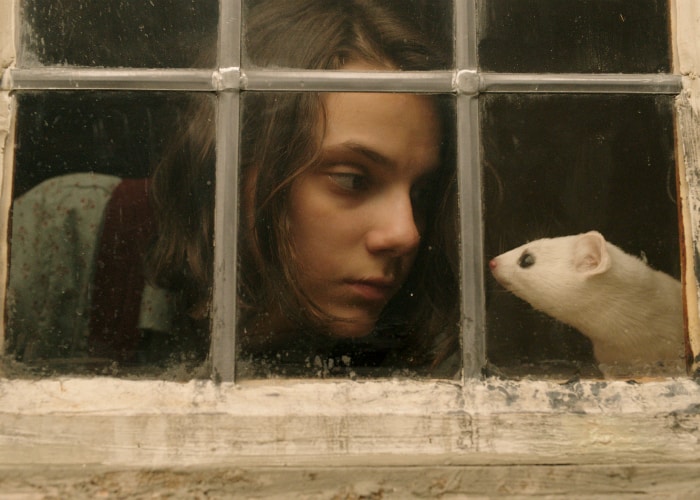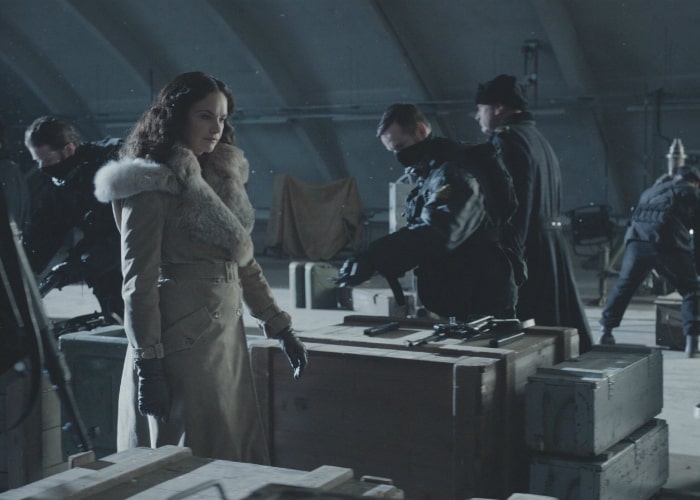
At long last, the BBC/HBO adaptation of His Dark Materials is nearly upon us. Having grown up with Philip Pullman’s trilogy of the same name, I’ve been anticipating this show for ages. I’ve spoken of it as the prophesied series that would deliver us from the flop of a 2007 film and lead us to the promised land. I had faith, and I truly believed.
That’s why it pains me so much to report that the new His Dark Materials is not going to deliver anything more than an ordinary, boilerplate fantasy more concerned with getting all its tropes in order than with embracing the spirit or the creativity of its source.
The miniseries is, when it comes down to it, lackluster.
To be clear, His Dark Materials isn’t necessarily bad. It’s nice to look at. Dafne Keen holds her own as Lyra, the very young protagonist and center of the action. The daemons — the physical embodiment of a soul that accompanies every human being in the story’s universe — are natural-looking.
The root of the problem is in the adaptation.
Rendering a book onscreen is always tricky, and readers are seldom satisfied. There are various ways to go about it, and they can all be successful. Some adaptations are relentlessly faithful to the source material. The good ones in plot points, the best ones in plot points and tone. Good Omens comes to mind. Some adaptations use their source material as a springboard, a framework that provides established characters and events to make its own statement while changing the story but not necessarily the tone. Annihilation is a good example. Both of these are excellent adaptations, for entirely different reasons.
Then there’s His Dark Materials.
The show is relatively strict about a lot of elements from the book, in a way that does it no favors. Instead, it gives the sense that it’s hammering out one plot point after another in a race to check boxes on a list of beats and conversations.
But then when it does bend the rules a little, veering from the source, its reasoning is inscrutable and frankly upsetting.
There are a couple of considerable changes that I won’t get into here for the sake of spoilers, so instead, I’ll focus on some smaller, “insignificant” moments that are extremely telling.
In the very first scene of The Golden Compass, the first of Pullman’s novels the show is based on, Lyra hides in a wardrobe after witnessing a murder plot against her uncle. She comes out of the wardrobe to save her uncle’s life, then goes back in to spy for him.
If you’re worried about spoilers, don’t be. This all happens in the first fifteen minutes of the show. What’s actually worrying is the fact that it plays almost exactly as it does in the book… minus the wardrobe.
Philip Pullman wrote his trilogy, in part, as an answer to a much older pillar of children’s fantasy: C.S. Lewis’s Chronicles of Narnia. Lewis’s first book, The Lion, the Witch and the Wardrobe, begins with a girl hiding in a wardrobe and then entering a strange land of magic and overt Christian allegory.
The Golden Compass, with unmistakable intent, begins with a girl hiding in a wardrobe and then immediately leaving it, to witness the dangers and hypocrisy of her own world dominated by overt Christian allegory.
But not in the show. In the show, Lyra watches the murder plot through an open window. Then she hides in… a bench? A radiator? It’s unclear what the thing is, but it sure as hell isn’t a wooden wardrobe of comfy fur coats.
It’s a small point to quibble, but it’s an important one. His Dark Materials is a rich and engaging fantasy epic. So are the Chronicles of Narnia. But the former was very much written to be an alternative to the latter, a non-religious fantasy for children with more questioning of authority and fewer crucifixions. The first scene is a clear nod to that.
And the show does away with it. Maybe it was hard to block. Perhaps the prop shop was fresh out of wardrobes. Who knows. But changing this key element meant to set the tone of the series shows a disregard, or lack of understanding, for what the tone actually is.
It gets all the beats right, but it loses the meaning behind them.

It’s a problem that comes up again and again. The right things happen in the right places, lines are often delivered verbatim from the text, but there’s nothing evident beneath the surface. None of the sly foreshadowing. None of the painstakingly careful worldbuilding. We’re told in the beginning, through words printed on the screen, that in this universe, people’s souls are represented physically as animals. Fair enough.
With that bit of exposition dealt with upfront, however, the smaller intricacies that go with it are handled hamfistedly. Lyra and her best friend Roger play in the crypt of the college where they live because that’s where the story says they play. But it doesn’t lead them to wonder about where the daemons of the dead bodies have gone. We learn that people can’t be separated from their daemons not when Lyra’s daemon Pan tenaciously pulls himself away from her to prove a point, but when we see a humanless daemon (something that is meaningless to the uninitiated viewer), and are only told later that there was anything odd about it.
The facts are there, but the nuance and the feeling are not. And the facts wind up as vestiges of good storytelling, kept for the express purpose of getting the plot on screen in as simple and tired a way as possible. For a show in which people have visible, tangible souls, its own soul is awfully hard to find.
Is there a greater irony? Probably. But this one sure is disappointing.
I’ve only seen the first four episodes of the season, so there’s still a chance the show will find its feet and change its tune. Maybe its daemon will saunter in, and all will be well. Here’s hoping.
His Dark Materials premiers on HBO on Monday, November 4th at 9 pm ET/PT.
Related Topics: BBC, HBO, His Dark Materials

